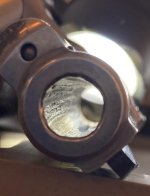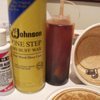If you shoot lead in a magnum, you deserve lead fouling.
I will take exception to this statement. I have fired many thousands of cast lead bullets in .357 magnum revolvers, at velocities in the 1200-1300 FPS range, with no problems at all. As others have pointed out, the bullet must fit the bore, be cast of an alloy appropriate for the velocity intended, and be properly lubricated.
When cleaning the revolvers I am not aware of any solvent that will remove lead deposits. The only method that works is cutting through the leading with a good bore brush (or Lewis lead remover) and this is best done completely dry as the first step in cleaning, followed by normal solvent and patch cleaning to remove powder residue.
Cleaning a revolver that has accumulated significant leading is a bit of a chore, but not a really major project. A good quality bronze bore brush is much harder than the lead, and much softer than the steel in the revolver. With enough passes through the bore and chambers it will remove the leading right down to the steel. Solvents or oils will only lubricate the passage of the bore brush, so the bore brush passes over the leading without cutting it away.
It can be very helpful to thoroughly "lead" a revolver one time. After that the shooter will learn to apply the correct precautions by selecting bullets of correct dimensions, correct hardness, and properly lubricated for use in that revolver.
Edited to add: I regularly shoot rifle calibers with cast lead bullets at velocities in the 2000-2500FPS range with no leading issues. The key issues remain bullet dimensions, alloy hardness, and lubrication appropriate for the use.


